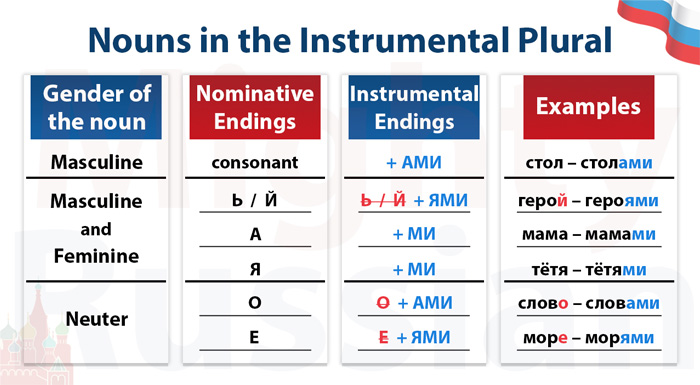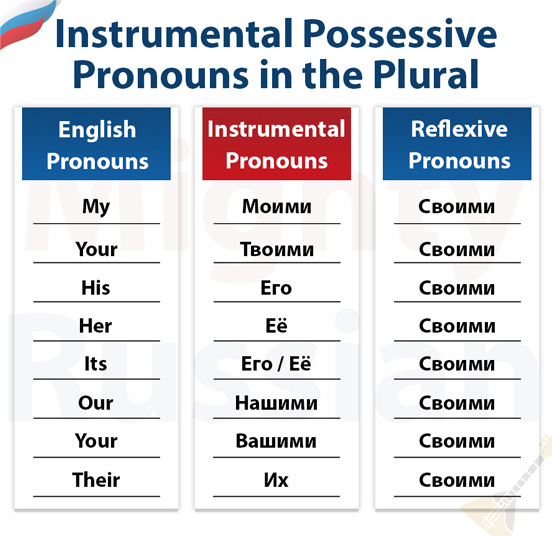Russian Instrumental Case in the Plural
In this lesson, you will learn how to use the Instrumental Case in the plural in Russian.
To make things easier, I will divide this lesson into 3 parts:
1) Plural Nouns in the Instrumental Case;
2) Plural Adjectives in the Instrumental Case;
3) Plural Possessive Pronouns in the Instrumental Case.
If there is any specific part of the lesson you would like to study first, you can click on the above titles in blue and go straight to that subject.
If you don’t know yet when you should use the Instrumental Case in Russian or how to use it in the singular, you can check out our complete lesson about this subject clicking here.
The Instrumental Case of Nouns in the Plural
Plural nouns in the Instrumental Case take only two endings: “АМИ” and “ЯМИ”.
Let’s take a look at when we should use each of these endings.
Nouns with the ending “АМИ”
1) When a noun ends in “А”, add “МИ”:
мама – мамами (mother)
дедушка – дедушками (grandfather)
машина – машинами (car)
сестра – сёстрами (sister)
2) When a masculine noun ends in a consonant, add “АМИ”:
врач – врачами (doctor)
стол – столами (table)
студент – студентами (student)
город – городами (city)
3) When a neuter noun ends in “О”, replace “О” with “АМИ”:
окна – окнами (window)
слово – словами (word)
дело – делами (business)
письмо – письмами (letter)
Nouns with the ending “ЯМИ”
1) When a noun ends in “Я”, add “МИ”:
тётя – тётями (aunt)
дядя – дядями (uncle)
2) When a neuter noun ends in “Е”, replace “Е” with “ЯМИ”:
море – морями (sea)
поле – полями (field)
3) When a noun ends in “Ь” or “Й”, replace the last letter with “ЯМИ”:
словарь – словарями (dictionary)
герой – героями (hero)
музей – музеями (museum)
тетрадь – тетрадями (notebook)
Note that according to Russian spelling rules, we don’t write “Я” after “Ж”, “Ч”, “Щ”, “Ш”, “Г”, “К” and “Х”. Instead, we write “А”:
ночь – ночами (night)
вещь – вещами (thing)
мышь – мышами (mouse)
This spelling rule is applied throughout all Russian grammar, so it is a good idea to memorize it.
If you are not familiar with the concept of gender in Russian, you can check out our complete lesson about it clicking here.
Now let’s learn how to use plural adjectives in the Instrumental Case.
The Instrumental Case of Adjectives in the Plural
Plural adjectives in the Instrumental Case have only 2 endings: “ЫМИ” and “ИМИ”.
1) When the adjective ends in “ЫЕ“, replace “ЫЕ” with “ЫМИ“:
Я разговариваю со старыми друзьями (I’m talking with old friends)
Школа гордится умными учениками (The school is proud of the smart students)
Она рисует цветными карандашами (She draws with colored pencils)
2) When the adjective ends in “ИЕ“, replace “ИЕ” with “ИМИ“:
Вчера я познакомился с русскими людьми (Yesterday I met Russian people)
Они оказались хорошими людьми (They turned out to be good people)
Они были плохими студентами (They were bad students)
The Instrumental Case of Possessive Pronouns in the Plural
These are all the Instrumental Possessive Pronouns that you will use in the Plural:
Here are some examples of how you can use them in a sentence:
Я горжусь своими детьми (I am proud of my kids)
Учитель хочет поговорить с твоими родителями (The teacher wants to talk with your parents)
Мы бы хотели быть вашими друзьями (We would like to be your friends)
And that’s all for this lesson. Now you know how to use the Instrumental Case in the Plural.
I hope everything got clear, but if you have any questions, just leave them in the comment section below.
I will be very happy to help you!














